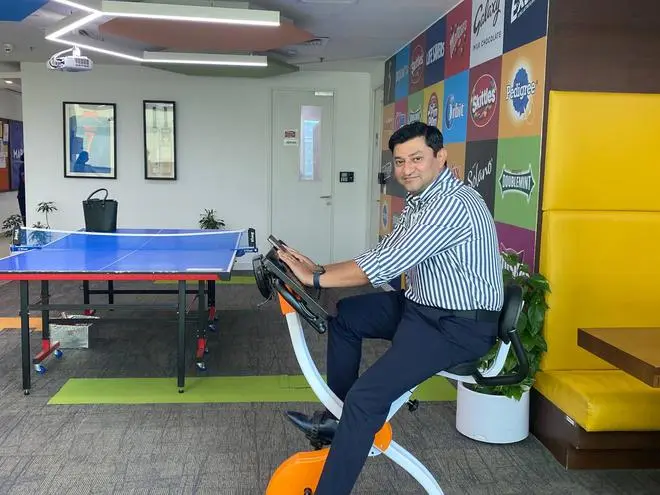Kalpesh R Parmar has a sweet strategy. The country general manager of Mars Wrigley, India, always carries chocolates in his pockets, distributing them generously around during business and personal meetings. Says the man who leads the India operations of the world’s leading producer of confectionery, “If I had known what a marvelous ice-breaker chocolates can be, I would have done this much earlier in my career!”
The gregarious Parmar, who did his hotel management from IHM Mumbai, came to Mars through an interesting career route – he started out in hospitality working in sales in Holiday Inn, but then decided to do a masters in management studies from Jamnalal Bajaj Institute of Management Studies and was snapped up from campus by Gillette. “I was very clear after the first year of hotel management that I need to study more. Those days the IHM course was a diploma one, so I also had to do my graduation through correspondence from Bombay University. There were times when I had back to back exams for both the courses,” he recalls.
We are at the Mars Wrigley corporate office in Gurgaon, a colourful space with the walls covered in funky fluorescent posters full of historical trivia about the legendary Mars brands like M&M, Snickers, Galaxy, Bounty, Juicy Fruit. For instance, you learn from the posters that M&M was the first candy in space in 1981, and that Snickers was named after the Mars family’s favourite horse. The $ 40 billion global company that is over a hundred years old (it started in 1911 ) is privately held by the Mars family.

Funky posters at the Mars Wrigley corporate office give fun trivia on its loved brands
For local tastes
An Orbit into the universe of Mars Wrigley India
In India, Parmar, says Mars is on a localising mission – the evidence is right there in the office – the vibrant posters have Indian artwork, quirky phrases in Hindi, and one learns that there is now a kesar pista variant of Snickers. “With our Pune factory, we have really been able to localise our assortment for brand Snickers. At the same time, it also helped us offer Snickers at Rs 10 in India,” he says.
Parmar, despite coming to Mars after a long stay abroad –he joined the company just before the pandemic from Unilever, where he was CEO of South Korea and the Pacific Islands/Mongolia and also led the ice-cream business in Japan and Hong Kong - is well equipped to lead Mars in its India growth story. Growing up in Mumbai – and with Gujarati enterprise in his DNA - is a huge qualification. “I always tell visitors from international markets that if you are able to embrace the complexity of Indian cities such as Bombay then that’s where the growth for the next 50 years is sitting,” he says.
“In countries like India, you need to keep your business very simple,” he emphasises, pointing out that despite several decades of presence, the consumption of chocolate is still small in the country, and there is a huge headroom for growth. “The focus has to be simple. If you can get your top 10 SKUs in as many stores as possible and focus on growing brand awareness, the business can take off,” he says. “And that’s where Mars has had good success. But this is just the beginning,” he asserts.
Parmar says he was lucky to have worked in his formative years for Gillette, which had visibility and availability as its core mantra, in tough markets like UP and MP, and then as brand manager at Marico.” “I was very fortunate to see Harsh Mariwala in action,” he says. From Marico he moved to Dubai as business head – Middle East, Africa and Latin America for Super-Max and traveled to nearly 25 markets. Then came the heady Unilever stint which fast tracked his career as Sanjiv Mehta (now CEO and MD HUL) sent him to Turkey to learn all about the modern trade ecosystem and then to Nigeria as Shopper Marketing and Modern Trade Director. The Korea stint was another big learning curve as ecommerce contribution to business even before the pandemic was as high as 30 per cent. Does he speak multiple languages? “No,” he confesses, but says, “I am good at understanding human beings.”

On the Table Talk Menu - delicious pan Asian fare from.Yum Yum Cha at the Mars office.
By now our lunch is served. It’s a huge spread from Yum Yum Cha – Thai curry, edamame, Noodles, a veg quinoa bowl, etc. Amidst this delicious Asian fare, there is also a massive bowl of chicken Biryani – which Parmar says has been specially cooked by one of the support staff Dipankar, who often delights the office by getting food for all from home. And the icing on the cake is the dessert – Snickers and Bounty ice cream from Gianis, with whom Mars has a tie up.

Chicken biryani cooked by Dipankar at the Mars office.
Parmar confesses he is a massive foodie and rattles off all that he loved in Korea and Singapore. But he says he balances his love for food by burning it out. Indeed, he says he gets his energy – he is Chief Energy Officer too at Mars – comes from his workouts. He also gets energised by meeting people - not only in office, but outside office too. “I think exploring different cultures has helped me. If you treat people with respect and you understand them as human beings, they will reciprocate,’ he says.

Full of energy: Kalpesh Parmar, who is also the chief energy officer at Mars Wrigley India says he derives his energy from workouts and meeting people.
Back to business, he describes how the pandemic years were very good for the whole snacking business. “India will be the third largest snacking market in the world by 2040,” he says. “The chocolate category in India is now about ₹13,000-₹14,000 crore and is growing at 10 per cent.” The company’s chocolate business is growing at a faster rate. “Gums, mints and candies is about a ₹9000 crore-category. Chocolate category is growing faster,” he adds.
The growth happened during the pandemic, he says, because a lot of share of mouth moved from the unorganised traditional Indian mithai to packaged food due to concerns around safety. “The chocolate category benefited from this most,” he says. Snickers, he says, with its peanut and almonds base is a great substitute for mithai and introducing variants like kesar pista, which incidentally is his own personal favourite, has helped.
Mars’ big play is in the mass segment. “The big opportunity for the chocolate category in India lies between Rs 5 and Rs 200,” he says. With a per capita consumption of just 150 gms annually, there is huge headroom, he says. Though Mars has products in the Rs 10 to Rs 300 range, Parmar says, “It’s very important to play at a 10 rupee price point. Once you have a Rs 10 product, the acceptance of the product increases across retailers as that is a key price point.That is the sweet spot and hence nearly 40 per cent of the category sits below the Rs 10 price point.We have Galaxy and M&M also at Rs 10 packs.” The younger generation he says is not that interested in the local mithai and that’s a big opportunity segment for Mars.
Growth drivers
Rural he says is a growth driver and the Rs 10 price point in chocolates works like a charm. Similarly chewing gum brands like Doublemint and Orbit are now available at Re 1 price points to expand rural reach.
Immersive retail is another growth driver for Mars globally. This is why when Freshpik opened doors in Bombay at Jio World Drive, Mars partnered with them as an experiment. “So we have M&M immersive retail store inside Freshpik store in the shop n shop format. It has been a good experience,” says Parmar.
Pet food is another business that is growing hugely in India, for Mars, which has big brands like Pedigree, Whiskas, Sheba, Royal Canin etc in its portfolio. The category is close to ₹4,000 crore, right now, with Mars having a leading market share. Parmar expects the category to double in the next four to five years growing at 15 per cent CAGR. “The key focus for us is how do we convert home-based food to packaged pet food as that’s where the growth is sitting.”
Again, just like in chocolates, the company is driving local manufacturing with its pet food factory in Hyderabad ramping capacity.
Parmar says that now that Mars is a huge sizable business in India , his focus as a leader is also on nurturing talent. “How do I inspire them to have a career in Mars? How do I develop them? How do I give them a message – that I am available for them - and be authentic about it?” he explains. Everyone who joins he says is given a culture lesson on the five principles that drive Mars – quality, responsibility, mutuality, efficiency and freedom.
“In the next five to 10 years, India will be one of our fastest growing markets,” says Parmar. “To exist as a company for the next 100 years, we have to win in emerging markets like Brazil and India. I think we should be able do the job,” he ends confidently.








Comments
Comments have to be in English, and in full sentences. They cannot be abusive or personal. Please abide by our community guidelines for posting your comments.
We have migrated to a new commenting platform. If you are already a registered user of TheHindu Businessline and logged in, you may continue to engage with our articles. If you do not have an account please register and login to post comments. Users can access their older comments by logging into their accounts on Vuukle.